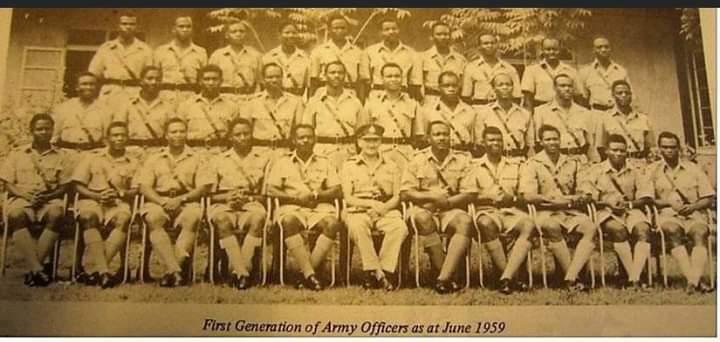
Mobutu Sese Seko, also called Mobutu Sese Seko Koko Ngbendu Wa Za Banga, original name Joseph (Désiré) Mobutu, (born October 14, 1930, Lisala, Belgian Congo [now Democratic Republic of the Congo]—died September 7, 1997, Rabat, Morocco), president of Zaire...
(now the Democratic Republic of the Congo) who seized power in a 1965 coup and ruled for some 32 years before being ousted in a rebellion in 1997.
Mobutu was educated in missionary schools and began his career in 1949 in the Belgian Congolese army, the Force Publique, rising from a clerk to a sergeant major, the highest rank then open to Africans.
While still in the army, Mobutu contributed articles to newspapers in Léopoldville (now Kinshasa). After his discharge in 1956 he became a reporter for the daily L’Avenir (“The Future”) and later editor of the weekly Actualités Africaines.
Through his press contacts Mobutu met the Congolese nationalist leader Patrice Lumumba, whose Congolese National Movement (Mouvement National Congolais; MNC) he joined soon after it was launched in 1958.
In 1960 Mobutu represented Lumumba at the Brussels Round Table Conference on Congo independence until the release of Lumumba, who had been jailed for his nationalist activities in the Congo.
During the conference, Mobutu supported Lumumba’s proposals (which were adopted) for a strongly centralized state for the independent Congo.
When the Congo became independent on June 30, 1960, the coalition government of President Joseph Kasavubu and Premier Lumumba appointed Mobutu secretary of state for national defense. Eight days later the Congo’s Force Publique mutinied against its Belgian officers.
As one of the few officers with any control over the army (gained by liberally dispensing commissions and back pay to the mutineers), Mobutu was in a position to influence the developing power struggle between Kasavubu and Lumumba.
Mobutu covertly supported Kasavubu’s attempt to dismiss Lumumba. When Lumumba rallied his forces to oust Kasavubu in September 1960, Mobutu seized control of the government and announced that he was “neutralizing” all politicians.
In February 1961, however, Mobutu turned over the government to Kasavubu, who made Mobutu commander in chief of the armed forces. Many believe that Mobutu bore some responsibility for the death of Lumumba, who was arrested by Mobutu’s troops and flown to Katanga, where, it...
is believed, he was killed by Congolese or Katangese troops.
As commander in chief Mobutu reorganized the army. In 1965, after a power struggle had developed between President Kasavubu and his premier, Moise Tshombe, Mobutu removed Kasavubu in a coup and assumed the presidency.
As commander in chief Mobutu reorganized the army. In 1965, after a power struggle had developed between President Kasavubu and his premier, Moise Tshombe, Mobutu removed Kasavubu in a coup and assumed the presidency.
Two years later Mobutu put down an uprising led by white mercenaries attached to the Congolese army. His efforts to revive the Congo’s economy included such measures as nationalizing the Katanga copper mines and encouraging foreign investment.
Agricultural revitalization lagged, however, and consequently, the need for food imports increased.
As president, Mobutu moved to Africanize names.
As president, Mobutu moved to Africanize names.
The name of the country was changed in October 1971 from the Democratic Republic of the Congo (Congo [Kinshasa]) to the Republic of Zaire (the country reverted to its earlier name in 1997).
In January 1972 he changed his own name from Joseph-Désiré Mobutu to Mobutu Sese Seko Koko Ngbendu Wa Za Banga (“The all-powerful warrior who, because of his endurance and inflexible will to win, will go from conquest to conquest, leaving fire in his wake”).
Mobutu attempted to soften military nature of his regime by filling government posts with civilians. He sought to build popular support through his Popular Movement of the Revolution (Mouvement Populaire de la Révolution; MPR), which until 1990 was the country’s only legal party.
Opposition to his rule came from numerous Congolese exiles, ethnic groups that had played decisive roles in previous governments, small farmers who gained no share in the attempted economic revival, and some university students.
He also faced a continuing threat of attacks on the Shaba region (Mobutu’s Africanized name for the Katanga province) by Katangese rebels based in Angola.
In 1977 Mobutu had to request French military intervention to repel an invasion of Zaire by Angolan-backed Katangese.
In 1977 Mobutu had to request French military intervention to repel an invasion of Zaire by Angolan-backed Katangese.
He was 'reelected' to the presidency in one-man contests in 1970 and 1977. Over the years Mobutu proved adept at maintaining his rule in the face of internal rebellions and attempted coups, but his regime had little success in establishing the conditions needed for economic...
growth and development. Endemic governmental corruption, mismanagement, and neglect led to the decline of the country’s infrastructure, while Mobutu himself reportedly amassed one of the largest personal fortunes in the world.
With the end of the Cold War in the 1990s, Mobutu lost much of the Western financial support that had been provided in return for his intervention in the affairs of Zaire’s neighbours. Marginalized by the multiparty system and ill, Mobutu finally relinquished...
control of the government in May 1997 to the rebel leader Laurent Kabila, whose forces had begun seizing power seven months earlier. Mobutu died in exile a short time later.
© Encyclopedia Britannica
#MobutuSeseSeko
#DRC
#AfricanHistoryClass
© Encyclopedia Britannica
#MobutuSeseSeko
#DRC
#AfricanHistoryClass
• • •
Missing some Tweet in this thread? You can try to
force a refresh



